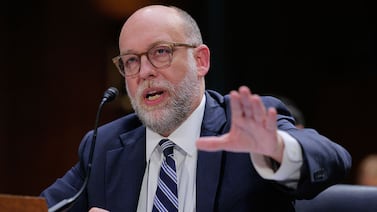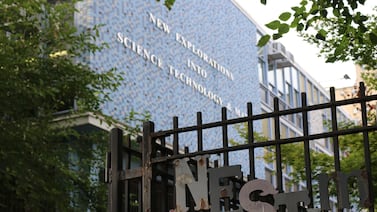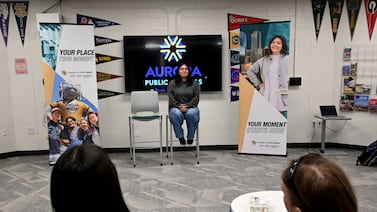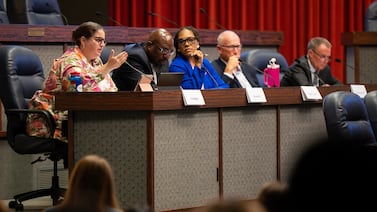Sign up for Chalkbeat Detroit’s free newsletter to keep up with the city’s public school system and Michigan education policy.
As community leaders worked with the City of Detroit to prevent violence in their neighborhoods last year, they came upon one big roadblock in their efforts to reach youth.
Staff and advocates of the grassroots organizations who had previous felony convictions were automatically denied volunteer opportunities in the Detroit school district, making it difficult for people who had turned their lives around to help youth avoid gangs, drugs, and violence.
Though some Detroit Public Schools Community District principals supported the organizations’ programs, the school system’s policy stopped some volunteers with prior criminal records from engaging with students.
“Some of my people, who I consider experts in their own right, I can’t really get them inside of the school,” said Ciera Reneé, programs and advocacy director for the nonprofit FORCE Detroit. “Or there’s hoops that you gotta jump through, like they can come in, but they have to be escorted.”
Now, that will no longer be the case. The district’s school board voted to change its volunteer policy last week. The district will allow those with certain felonies on their records to volunteer if they receive approval from Superintendent Nikolai Vitti or a designee.
Board Member Sherry Gay-Dagnogo said during a recent committee meeting that many community advocates “completely change their lives around” and are “making an impact with our schools.”
The district will continue to perform background checks required for all volunteers. People with felonies will be considered if they meet criteria set in the district’s administrative guidelines, which the policy says will be developed by the superintendent.
The policy change comes during a summer marked by several incidents of gun violence involving youth in the city. The shooting deaths of a 4-year-old and an 18-year-old at Skinner Park, the killing of a 16-year-old on the east side, and the shootings of three teens at an alleged illegal street gathering, led the city to enforce a new curfew and a “crackdown” on drag racing.
“That’s not something that we should have to tolerate or accept,” said Michael Peterson, program administrator of the city’s Community Violence Intervention, or CVI, program. “I think having these groups in the schools is speaking exactly to that — what could be done to prevent those instances.”
For two years, the city’s CVI program has worked with community groups in seven neighborhoods that experience higher rates of violence.
According to city officials, there has been a decrease in violence in those neighborhoods since the program began.
The community groups – which include FORCE Detroit, Detroit People’s Community, Detroit 300, New Era Community Connection, Detroit Friends & Family, and Camp Restore Detroit, among others – began specific initiatives to prevent violence by engaging youth during the last school year.
Reneé said when the group held events in their west side neighborhood, community leaders noticed many of the participants were youth.
“We wanted to start focusing more on prevention,” she told Chalkbeat. “So, we thought if we went inside of the schools, there’s the biggest opportunity to reach the most amount of children.”
The group started participating in assemblies last school year at Cody High School in the city’s west side.
“We talked to them about violence and whether or not they felt safe,” said Reneé.
The group learned through student surveys that students wanted to see FORCE Detroit’s presence at their school. That prompted a lunchtime program.
“We come into the school and we engage with them,” Reneé said. “We built these relationships, and we were able to find out what some of their core needs were.”
During lunchtimes, FORCE Detroit’s staff and advocates helped monitor the kids and eventually facilitated basketball and other yard games.
“They’re not trying to find some trouble, because they got something to do,” said Reneé.
The group found talking with students one-on-one and in small groups to be more effective than in large assembly settings. She said it was easier to teach deescalation and conflict resolution tactics, and it was easier to learn what support the kids needed at home to be able to attend school. They could also hear the specific safety needs of each student, such as more patrolling by the community group in Stein Park.
Peterson said advocates from the students’ communities are likely the best voices to reach struggling youth because they share similar backgrounds and experiences.
“The messenger can make all the difference,” he said. “You can say all the right things, but if it’s not shared by the right person, it may not be received the right way.”
The volunteers who were denied by the district go through a separate vetting by the city before they can work with the six community organizations, said Peterson.
Before they can get involved, they undergo a background check by the police department to ensure they don’t have pending charges or any convictions related to harming or endangering children.
“Safety of the kids is always going to be the priority, so no one’s trying to skip that at all,” Peterson said.
Many of the previous convictions of some of the volunteers included drug charges, Peterson said.
In one case, a volunteer had a 20-year-old manslaughter conviction.
“This particular individual has completely changed their life around and has been nothing but a pillar in the community since then,” said Peterson. “I mean, has really gone above and beyond to try and make sure that no one else has followed in their footsteps.”
Reneé said the district’s policy change sends a message to the advocates who were previously denied by the school system that they have valuable experience and skills to help support students in need.
FORCE Detroit, as well as the other neighborhood organizations, will be able to expand their school programming this coming school year, said Peterson.
In addition to having more lunchtime volunteers, the group plans on having advocates attend re-admittance meetings for students returning from suspensions at Cody High School.
The practice will allow the group to understand trends and offer additional support to individual students.
“If they got suspended, obviously, it was for a reason,” she said. “And if there’s something that we can figure out ways to support, then I think we should be there firsthand.”
Hannah Dellinger covers Detroit schools for Chalkbeat Detroit. You can reach her at hdellinger@chalkbeat.org.






